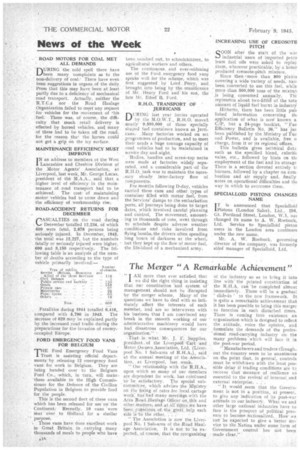The Merger "A Remarkable Achievement"
Page 20

If you've noticed an error in this article please click here to report it so we can fix it.
I AM more than ever satisfied. that
. we did the right thing in insisting that our constitution and system, of' management should not he disrupted by the merger scheme. Many of the questions we have to deal with so intimately, affect the interests of each member, and are so interwoven with his business that I am convinced any break in the smooth working of our administrative machinery would have had disastrous consequences for our Organization."
.That. is. what Mr. J. .1-7 Supplies, president.. of the Liverpool Cart and Motor, ,Ow ners Association, Ltd. (Liverpool No. 1 Sub-area of R.H.A,), said at the annual meeting of the. Association, • at 'Liverpool, last week, " Our relationship with the R.H.A„ upon which so many of our members are dependent for work,. haS continued tO.be satisfactory. The special subcommittee, which advises the Mipistry on the fs.xingof rates tor local, cartage vyorls: has had 'many meetiriga with the Area Roadeliaulage Officer on this and otheranatters; and at all' times we have benn:',cOriseions of the great, help each side is-to the other. . . .
" The Association is now the Liverpool No, I Sub-area of the Road Haulage Association, It is not to 'be expected, of course; that the reorganizing
of the industry so as to bring it into line with' the printed constitution Cif the R.H.A. can The completed almost immediately. There will be a• gradual ' slide-in ' to the new framework. It is quite a remarkable achievement that it has been possible to bring this merger to function in such disturbed times. There is coming into existence an organization which is designed to reflect the attitude, voice the opinion, and formulate the demands of the proles' sional road-carrying industry on the many problems which will face it la the post-war period.
"Manufacturers and traders tgroug hout the country seem to be unanimous the point that, in general, controls must be withdrawn with the least possible delay if trading conditions are to recover that measure of resilience so essential to the revival of internal and external enterprise. . . .
" It would _seem that the Government is not in a position, at present, to give any indication of its post-war attitude to our industry. What we and other large national industries have to face is the prospect of political pres
sure to become nationalized.we can be expected to givea btter Service to the Nation under some form of Government control has not been made clear."




















































